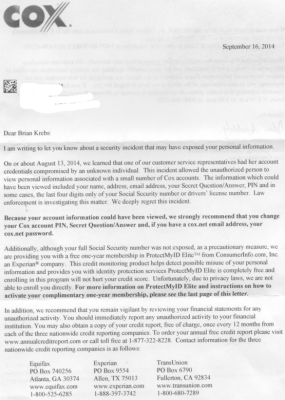FCC Fines Cox $595K Over Lizard Squad Hack
 I suspected, but couldn’t prove at the time, that the band of teenage cybercriminals known as the Lizard Squad was behind the attack. According to a press release issued Thursday by the FCC, the intrusion began after LizardSquad member “Evil Jordie” phoned up Cox support pretending to be from the company’s IT department, and convinced both a Cox customer service representative and Cox contractor to enter their account IDs and passwords into a fake, or “phishing,” website.
I suspected, but couldn’t prove at the time, that the band of teenage cybercriminals known as the Lizard Squad was behind the attack. According to a press release issued Thursday by the FCC, the intrusion began after LizardSquad member “Evil Jordie” phoned up Cox support pretending to be from the company’s IT department, and convinced both a Cox customer service representative and Cox contractor to enter their account IDs and passwords into a fake, or “phishing,” website.“With those credentials, the hacker gained unauthorized access to Cox customers’ personally identifiable information, which included names, addresses, email addresses, secret questions/answers, PIN, and in some cases partial Social Security and driver’s license numbers of Cox’s cable customers, as well as Customer Proprietary Network Information (CPNI) of the company’s telephone customers,” the FCC said. “The hacker then posted some customers’ information on social media sites, changed some customers’ account passwords, and shared the compromised account credentials with another alleged member of the Lizard Squad.”
My September 2014 column took Cox to task for not requiring two-step authentication for employees: Had the company done so, this phishing attack probably would have failed. As a condition of the settlement with the FCC, the commission said Cox has agreed to adopt a comprehensive compliance plan, which establishes an information security program that includes annual system audits, internal threat monitoring, penetration testing, and additional breach notification systems and processes to protect customers’ personal information, and the FCC will monitor Cox’s compliance with the consent decree for seven years.
It’s too bad that it takes incidents like this to get more ISPs to up their game on security. It’s also too bad that most ISPs hold so much personal and sensitive information on their customers. But there is no reason to entrust your ISP with even more personal info about yourself — such as your email. If you need a primer on why using your ISP’s email service as your default or backup might not be the best idea, see this story from earlier this week.
If cable, wireless and DSL companies took customer email account security seriously, they would offer some type of two-step authentication so that if customer account credentials get phished, lost or stolen, the attackers still need that second factor — a one-time token sent to the customer’s mobile phone, for example. Unfortunately, very few if any of the nation’s largest ISPs support this basic level of added security, according to twofactorauth.org, a site that tracks providers that offer it and shames those that do not.
Then again, perhaps the FCC fines will push ISPs toward doing the right thing by their customers: According to The Washington Post‘s Brian Fung, the FCC is offering in this action another sign that it is looking to police data breaches and sloppy security more closely.
No comments:
Post a Comment